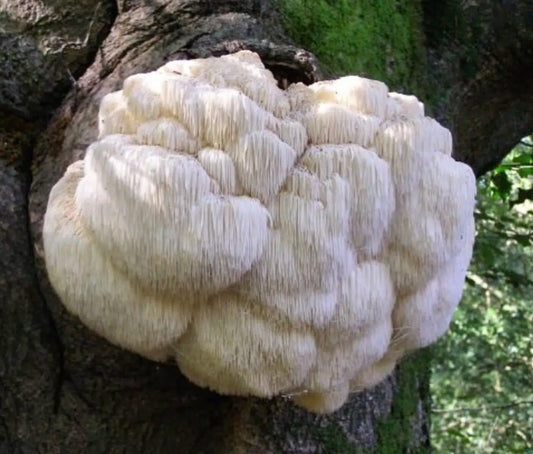Some facts about maitake mushrooms (Grifola frondose) include that it is a type of edible mushroom that grows at the base of oak, maple, and elm trees. Maitake mushrooms are originally from Japan and people would dance for joy when they found them. Maitake mushrooms are also referred to as “hen of the woods” as they resemble the tail of a hen.
The most notable 17 facts about maitake mushrooms include that they can assist in treating diabetes, reduce blood pressure, assist in weight loss, and fight many types of cancer. Maitake mushrooms can also lower cholesterol, improve the immune system, stabilize hormones, and can grow to over 100 pounds.
If you haven’t been consuming maitake mushrooms, you are missing out on a wide range of health benefits.
Facts About Maitake Mushrooms
17. Maitake Mushrooms Are Useful In Treating Diabetes
Studies have shown that consuming maitake mushrooms can improve glucose metabolism and reduce blood sugar levels, as well as help manage weight gain associated with diabetes. (Kubo et al., 1994)
In an experiment on diabetic rats, maitake was shown to reduce the symptoms of diabetes, suggesting that there are bioactive compounds in maitake mushrooms that have anti-diabetic properties. (Horio & Ohtsuru, 2001)
Maitake mushrooms are known to be a potent source of beta-glucans and other polysaccharides which can help to slow down the absorption of glucose into the body. (Bashir & Choi, 2017) This helps to prevent sudden spikes in blood sugar levels, thereby reducing the risk of developing diabetes or other related health conditions.

16. Maitake Mushrooms Can Reduce High Blood Pressure
In a study on hypertensive rats, a notable drop in blood pressure was observed after consuming maitake mushrooms for 8 weeks. In the same study, shiitake mushrooms didn’t cause a drop in blood pressure but decreased cholesterol and triglycerides. (Kabir, 1989)
In another study on aging female hypertensive rats, it was noted that consumption of maitake mushroom fractions reduced hypertension due to the effects it has on the renin–angiotensin system (RAS). The same study noted that maitake mushrooms increased insulin sensitivity and reduced inflammation. (Preuss et al., 2010)
15. Maitake Mushrooms Assist With Weight Loss
Maitake mushrooms facilitate weight loss because they restore insulin sensitivity. Regulating blood sugar with proper insulin function is at the heart of maitake’s anti-obesity effects. According to one study, insulin sensitivity restoration is mediated through the activation of the PPARδ insulin signaling pathway. This study goes on to say that mushrooms are functional foods that can prevent diseases like obesity and diabetes. (Aoki et al., 2018)
14. Maitake Mushrooms Have High Quantities Of Ergothioneine
Maitake mushrooms contain high quantities of ergothioneine. Other mushrooms with significant ergothioneine concentrations include oyster and shiitake mushrooms. (Food Chemistry, 2017)
Many studies have shown that low levels of ergothioneine are linked with a range of neurological disorders and diseases. This includes Alzheimer’s, Parkinson’s, dementia, and other age-related diseases. While there is still research being conducted to determine the exact mechanisms behind these connections, it has become clear that increasing one’s ergothioneine intake can provide a range of benefits to overall health.
Eating mushrooms is one of the best ways to increase ergothioneine levels in the body since they contain some of the highest concentrations found in nature. Studies have found that ergothioneine is linked to improved cognitive functioning and memory, can help reduce stress, improve mood, and reduce the risk of developing mental health disorders such as depression and anxiety. (Beelman et al., 2020)
In other words, eat maitake mushrooms to maintain excellent mental health for a lifetime.
13. Maitake Mushrooms Are Good For Mental Health
Maitake mushrooms are known for their mental health benefits, largely due to the fact that they contain high levels of ergothioneine, as we just noted.
Maitake mushrooms are also a rich source of many other vitamins, minerals, and amino acids that benefit mental health. They contain vitamin B6 and folate, which can help fight stress and improve mood. They also provide important minerals such as magnesium, zinc, selenium, and iron, which are essential for proper brain functioning. Additionally, maitake mushrooms contain choline, an important nutrient needed for the production of neurotransmitters such as serotonin and dopamine. (FoodData Central, 2023)
Eating maitake mushrooms on a regular basis can offer long-term mental health benefits in addition to providing essential nutrients for optimal brain functioning.
Other mushrooms are also good for mental health. However, one mushroom, Lion’s mane, stands out among the pack when it comes to improving mental health. Lion’s mane promotes NGF synthesis and BDNF secretion, leading to neural tissue growth. In other words, Lion’s mane is a must-have in the fight against age-related mental decline.
12. Maitake Mushrooms Are An Adaptogen
Maitake mushrooms are considered an adaptogen, which means that they can increase the body’s ability to cope with physical and mental stress. Adaptogens are unique in that they are able to bring balance to unbalanced systems within the body. In many cases, adaptogens can regulate normal hormone function, reducing excessive cortisol that leads to unnecessary stress.
Adaptogens are able to lessen fatigue, significantly reduced anxiety, improve depression, enhance cognitive performance, and are neuroprotective, meaning that they protect the brain. (Panossian & Wikman, 2010)
Typically, adaptogens need to be consumed for a period of at least 3 weeks before any noticeable effects are noted.

11. Maitake Mushrooms Promote Female Fertility
Some research suggests that maitake mushrooms may be beneficial for those suffering from polycystic ovarian syndrome (PCOS). Studies have shown that consuming maitake extract helped 77% of previously sterile women ovulate, putting maitake mushrooms on par with typical medication designed to treat this condition. (Chen et al., 2010)
10. Maitake Mushrooms Lower Cholesterol Levels
The beta-glucans contained in maitake mushrooms both reduce the absorption of sugar and cholesterol within the digestive tract. These beta-glucans are prebiotics, meaning that they are food for bacteria living within our gut.
In one study, mice that were fed a diet high in cholesterol determined that maitake mushrooms significantly lowered the amount of cholesterol that was able to pass through the digestive tract and into the body, as indicated by plasma cholesterol levels. (Sato et al., 2013)
9. Maitake Mushrooms Improve Gut Health
As stated before, beta-glucans are a food source for gut bacteria. Additionally, the beta-glucans contained in maitake mushrooms improve the growth of the microbiome, increase their viability, and encourage the colonization of probiotic bacteria. (Russo et al., 2012)
This is why maitake mushrooms and other mushrooms are considered a functional food, as they improve the makeup of the microbiome, leading to better health overall. While the science behind the microbiome is still in its infancy, it is already clear that our microbiome determines not only how healthy we are, but who we are. (Microbiome, 2022)
8. Maitake Mushrooms Have High Levels Of Antioxidants
Maitake mushrooms contain high levels of antioxidants. Some of these antioxidants include flavonoids, phenols, vitamin C, and vitamin E. Maitake mushrooms that are grown in the wild and exposed to sunlight also contain high quantities of vitamin D. (Yeh et al., 2011)
7. Maitake Mushrooms Optimize The Immune System
Maitake mushrooms are packed with immune-boosting compounds. In particular, the beta-glucans found in maitake mushrooms have been shown to help strengthen the body’s natural defenses against viruses like herpes simplex type 1. By optimizing and stimulating the activities of white blood cells, these beta-glucans can act as a protective shield, preventing the body from falling victim to infections and illnesses. (Akramiene et al., 2007)
Beta-glucans are also found to be effective in providing relief from respiratory tract infections in both children and athletes. Studies have shown that beta-glucans can help reduce the severity of symptoms associated with such infections, including coughing, sneezing, and congestion. (Jesenak et al., 2013) (Bergendiova et al., 2011)
Combining maitake with shiitake mushrooms invokes the strongest immune system response, as measured by phagocytosis, NK activity, Interleukin secretions, and C-reactive protein. (Vetvicka, 2014)
6. Maitake Mushrooms Reduce Inflammatory Bowel Conditions
An extract of maitake mushrooms was shown to reduce inflammation of the intestines by suppressing TNF-alpha production and its signaling method. Since TNF-alpha is directly involved in conditions like inflammatory bowel disease, compounds within maitake mushrooms can provide relief for individuals who are suffering from inflammatory bowel diseases like Crohn’s disease, and ulcerative colitis. (Lee et al., 2010)

5. Maitake Mushrooms Fight Against Many Types Of Cancer
The most noteworthy benefit of consuming maitake mushrooms comes in the form of preventing and even killing cancer cells. Most of the compounds responsible for fighting cancer are contained in a specific extract of maitake mushrooms known as D-Fraction.
In one study, the D-Fraction extract of maitake mushrooms was shown to suppress malignant breast cancer cells. D-Fraction extract was shown to block tumor cell growth and its ability to proliferate. Additionally, this extract activated cellular pathways that caused cancer cell apoptosis, or cell death. D-Fraction was also able to reduce the ability for breast cancer cells to metastasize, or spread throughout the body. (Alonso et al., 2013)
In another study on maitake D-Fraction extract and its effect on cancer cells, it was noted that the compounds contained in the extraction were able to enhance the immune system, specifically the macrophages, T cells, and natural killer (NK) cells. Through this immune system response, D-Fraction is able to repress cancer cell progression. (Kodama et al., 2003)
In yet another study, D-Fraction was given to individuals with stage II to stage IV cancer. In the majority of cases, there was a significant improvement in symptoms and even cancer regression. Specifically, 68.8% of breast cancer patients, 62.5% of lung cancer patients, and 58.3% of liver cancer patients all experienced a regression in their cancer after consuming D-Fraction. (Kodama et al., 2002)
4. Maitake Mushrooms Were Given As Gifts In Ancient Japan
In ancient Japan, Maitake mushrooms were given as special gifts. The mushroom was prized for its medicinal properties, which included treating asthma and other lung diseases. They were also believed to be capable of strengthening the immune system and aiding in weight loss. Maitake mushrooms were often harvested from deep forests or hidden caves in Japan, adding to their mystique and value.
The gift-giving tradition of Maitake mushrooms became so popular that there is even a Japanese proverb associated with it: “Maitake no oiwai ni” (giving maitakes as gifts). This proverb was used by parents as an encouragement to their children when they achieved something great or made a large accomplishment. It had the same meaning as the Western expression of “giving someone a pat on the back.”
The Maitake mushroom was also served at special festivals and ceremonies, such as weddings. In modern times, Maitake mushrooms are still a popular gift in Japan and have even become popular around the world.
3. Maitake Mushrooms Was Worth Its Weight In Silver
Maitake mushrooms have a long history in Japan, where they were once so highly valued that they were worth their weight in silver.
2. Maitake Mushrooms Can Grow To Over 100 Pounds
Maitake mushrooms are truly unique due to their incredible size. It’s not uncommon for mature maitake mushrooms to reach sizes of over 100 pounds!
Maitake mushrooms are mostly found in the wild since they cannot be cultivated very easily. They typically emerge from their tree-bound location in early spring or late autumn when soil temperatures reach 45-50 degrees Fahrenheit.
If you’re lucky enough to find a maitake mushroom large enough to weigh over 100 pounds, it’s wise to take advantage of your good fortune by harvesting small amounts. In order to make sure that the maitake mushrooms continue growing, only about 10% of the mushroom should be harvested.
1. Maitake Mushrooms Have Been Nicknamed The King Of Mushrooms
Maitake mushrooms have been lovingly nicknamed “The King of Mushrooms” due to their size, unique medicinal properties, and impressive health benefits.
17 Facts About Maitake Mushrooms
Most of the facts about Maitake mushrooms are based on their health benefits, which is one reason they are so highly prized. They can help boost the immune system, reduce inflammation, and even help with weight loss. Studies have also shown that maitake mushrooms may be able to reduce the risk of some types of cancer. Maitake mushrooms are a great source of vitamins, minerals, proteins, fiber, and antioxidants. All these benefits make maitake mushrooms an ideal food for everyone who wants to live a healthy lifestyle.
If you want to buy fresh mushrooms, oyster mushroom, grow kit, or a lion’s mane mushroom grow kit so you can sprout your own mushrooms, we have everything you need.
References
1 Kubo K, Aoki H, Nanba H. Anti-diabetic activity present in the fruit body of Grifola frondosa (Maitake). I. Biol Pharm Bull. 1994 Aug;17(8):1106-10. doi: 10.1248/bpb.17.1106. PMID: 7820117.
2 Horio H, Ohtsuru M. Maitake (Grifola frondosa) improve glucose tolerance of experimental diabetic rats. J Nutr Sci Vitaminol (Tokyo). 2001 Feb;47(1):57-63. doi: 10.3177/jnsv.47.57. PMID: 11349892.
3 Bashir, K. M. I., & Choi, J. S. (2017). Clinical and Physiological Perspectives of β-Glucans: The Past, Present, and Future. International journal of molecular sciences, 18(9), 1906. https://doi.org/10.3390/ijms18091906
4 Kabir Y, Kimura S. Dietary mushrooms reduce blood pressure in spontaneously hypertensive rats (SHR). J Nutr Sci Vitaminol (Tokyo). 1989 Feb;35(1):91-4. doi: 10.3177/jnsv.35.91. PMID: 2738717.
5 Preuss, H. G., Echard, B., Bagchi, D., & Perricone, N. V. (2010). Maitake mushroom extracts ameliorate progressive hypertension and other chronic metabolic perturbations in aging female rats. International journal of medical sciences, 7(4), 169–180. https://doi.org/10.7150/ijms.7.169
6 Aoki H, Hanayama M, Mori K, Sato R. Grifola frondosa (Maitake) extract activates PPARδ and improves glucose intolerance in high-fat diet-induced obese mice. Biosci Biotechnol Biochem. 2018 Sep;82(9):1550-1559. doi: 10.1080/09168451.2018.1480348. Epub 2018 Jun 6. PMID: 29873587.
7 Food Chemistry Volume 233, 15 October 2017, P429-433 https://doi.org/10.1016/j.foodchem.2017.04.109
8 Beelman, R. B., Kalaras, M. D., Phillips, A. T., & Richie, J. P., Jr (2020). Is ergothioneine a ‘longevity vitamin’ limited in the American diet?. Journal of nutritional science, 9, e52. https://doi.org/10.1017/jns.2020.44
9 FoodData Central. (2023). https://fdc.nal.usda.gov/fdc-app.html
10 Panossian, A., & Wikman, G. (2010). Effects of Adaptogens on the Central Nervous System and the Molecular Mechanisms Associated with Their Stress-Protective Activity. Pharmaceuticals (Basel, Switzerland), 3(1), 188–224. https://doi.org/10.3390/ph3010188
11 Chen JT, Tominaga K, Sato Y, Anzai H, Matsuoka R. Maitake mushroom (Grifola frondosa) extract induces ovulation in patients with polycystic ovary syndrome: a possible monotherapy and a combination therapy after failure with first-line clomiphene citrate. J Altern Complement Med. 2010 Dec;16(12):1295-9. doi: 10.1089/acm.2009.0696. Epub 2010 Oct 29. PMID: 21034160.
12 Sato M, Tokuji Y, Yoneyama S, Fujii-Akiyama K, Kinoshita M, Chiji H, Ohnishi M. Effect of dietary Maitake (Grifola frondosa) mushrooms on plasma cholesterol and hepatic gene expression in cholesterol-fed mice. J Oleo Sci. 2013;62(12):1049-58. doi: 10.5650/jos.62.1049. PMID: 24292357.
13 Russo, P., López, P., Capozzi, V., De Palencia, P. F., Dueñas, M. T., Spano, G., & Fiocco, D. (2012). Beta-glucans improve growth, viability and colonization of probiotic microorganisms. International journal of molecular sciences, 13(5), 6026–6039. https://doi.org/10.3390/ijms13056026
14 Microbiome. (2022, April 5). National Institute of Environmental Health Sciences. https://www.niehs.nih.gov/health/topics/science/microbiome/index.cfm
15 Yeh, J. Y., Hsieh, L. H., Wu, K. T., & Tsai, C. F. (2011). Antioxidant properties and antioxidant compounds of various extracts from the edible basidiomycete Grifola frondosa (Maitake). Molecules (Basel, Switzerland), 16(4), 3197–3211. https://doi.org/10.3390/molecules16043197
16 Akramiene D, Kondrotas A, Didziapetriene J, Kevelaitis E. Effects of beta-glucans on the immune system. Medicina (Kaunas). 2007;43(8):597-606. PMID: 17895634.
17 Jesenak, M., Majtan, J., Rennerova, Z., Kyselovic, J., Banovcin, P., & Hrubisko, M. (2013). Immunomodulatory effect of pleuran (β-glucan from Pleurotus ostreatus) in children with recurrent respiratory tract infections. International immunopharmacology, 15(2), 395–399. https://doi.org/10.1016/j.intimp.2012.11.020
18 Bergendiova, K., Tibenska, E., & Majtan, J. (2011). Pleuran (β-glucan from Pleurotus ostreatus) supplementation, cellular immune response and respiratory tract infections in athletes. European journal of applied physiology, 111(9), 2033–2040. https://doi.org/10.1007/s00421-011-1837-z
19 Vetvicka V, Vetvickova J. Immune-enhancing effects of Maitake (Grifola frondosa) and Shiitake (Lentinula edodes) extracts. Ann Transl Med. 2014 Feb;2(2):14. doi: 10.3978/j.issn.2305-5839.2014.01.05. PMID: 25332990; PMCID: PMC4202470.
20 Alonso, E. N., Orozco, M., Eloy Nieto, A., & Balogh, G. A. (2013). Genes related to suppression of malignant phenotype induced by Maitake D-Fraction in breast cancer cells. Journal of medicinal food, 16(7), 602–617. https://doi.org/10.1089/jmf.2012.0222
21 Kodama N, Komuta K, Nanba H. Effect of Maitake (Grifola frondosa) D-Fraction on the activation of NK cells in cancer patients. J Med Food. 2003 Winter;6(4):371-7. doi: 10.1089/109662003772519949. PMID: 14977447.
22 Kodama N, Komuta K, Nanba H. Can maitake MD-fraction aid cancer patients? Altern Med Rev. 2002 Jun;7(3):236-9. PMID: 12126464.



